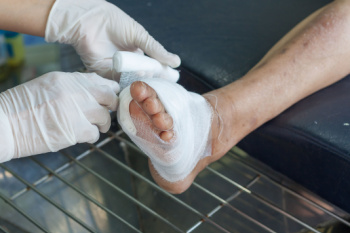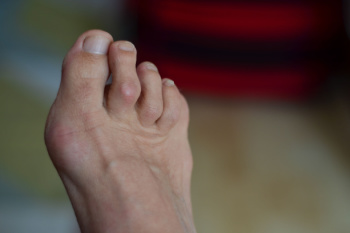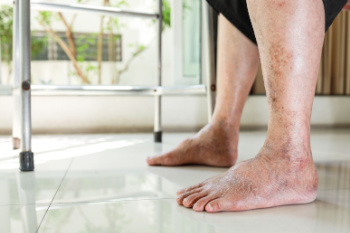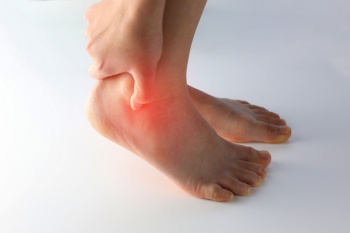Items filtered by date: April 2024
The Impact of Gout on Men

Gout, often characterized by sudden and intense joint pain, is a type of inflammatory arthritis that predominantly affects men. This condition occurs when uric acid levels in the blood become elevated, leading to the formation of urate crystals in the joints. Men are more susceptible to gout than women, with the risk increasing with age. Several factors contribute to this gender disparity, including hormonal differences, genetic predisposition, and lifestyle factors such as diet and alcohol consumption. The symptoms of gout typically appear in the joint of the big toe, causing swelling, redness, and extreme pain, although other joints may also be affected. Beyond the physical discomfort, gout can have a significant impact on quality of life, leading to decreased mobility, increased risk of disability, and psychological distress. Managing gout involves a combination of medication, lifestyle modifications, and dietary changes aimed at reducing uric acid levels and preventing recurrent attacks. If you have experienced one or more gout attacks, it is suggested that you are under the care of a podiatrist who can help you manage this condition.
Gout is a foot condition that requires certain treatment and care. If you are seeking treatment, contact our podiatrists from CNY Foot Surgery & Podiatry Care. Our doctors will treat your foot and ankle needs.
What Is Gout?
Gout is a type of arthritis caused by a buildup of uric acid in the bloodstream. It often develops in the foot, especially the big toe area, although it can manifest in other parts of the body as well. Gout can make walking and standing very painful and is especially common in diabetics and the obese.
People typically get gout because of a poor diet. Genetic predisposition is also a factor. The children of parents who have had gout frequently have a chance of developing it themselves.
Gout can easily be identified by redness and inflammation of the big toe and the surrounding areas of the foot. Other symptoms include extreme fatigue, joint pain, and running high fevers. Sometimes corticosteroid drugs can be prescribed to treat gout, but the best way to combat this disease is to get more exercise and eat a better diet.
If you have any questions please feel free to contact our office located in East Syracuse, NY . We offer the newest diagnostic and treatment technologies for all your foot and ankle needs.
Important Facts to Know about Diabetic Feet

Diabetic feet represent a significant concern for individuals living with diabetes, as the condition can lead to various complications affecting foot health. One critical fact about diabetic feet is the increased risk of nerve damage, known as peripheral neuropathy, which can result in reduced sensation and difficulty detecting injuries or ulcers. Additionally, diabetes can impair blood circulation, leading to poor wound healing and an increased susceptibility to infections. Individuals with diabetes are also prone to developing foot ulcers, which, if left untreated, can escalate into serious complications such as gangrene and amputation. Proper foot care and regular inspections are essential for individuals with diabetes to prevent complications. This includes keeping the feet clean and moisturized, wearing comfortable and well-fitting shoes, inspecting the feet daily for cuts or sores, and seeking prompt medical attention for any signs of infection or injury. If you have diabetes, it is strongly suggested that you are under the care of a podiatrist who can help you manage this serious condition.
Diabetic foot care is important in preventing foot ailments such as ulcers. If you are suffering from diabetes or have any other concerns about your feet, contact our podiatrists from CNY Foot Surgery & Podiatry Care. Our doctors can provide the care you need to keep you pain-free and on your feet.
Diabetic Foot Care
Diabetes affects millions of people every year. The condition can damage blood vessels in many parts of the body, especially the feet. Because of this, taking care of your feet is essential if you have diabetes, and having a podiatrist help monitor your foot health is highly recommended.
The Importance of Caring for Your Feet
- Routinely inspect your feet for bruises or sores.
- Wear socks that fit your feet comfortably.
- Wear comfortable shoes that provide adequate support.
Patients with diabetes should have their doctor monitor their blood levels, as blood sugar levels play such a huge role in diabetic care. Monitoring these levels on a regular basis is highly advised.
It is always best to inform your healthcare professional of any concerns you may have regarding your feet, especially for diabetic patients. Early treatment and routine foot examinations are keys to maintaining proper health, especially because severe complications can arise if proper treatment is not applied.
If you have any questions please feel free to contact our office located in East Syracuse, NY . We offer the newest diagnostic and treatment technologies for all your foot and ankle needs.
What Are Causes of Hammertoe?

Hammertoe, a common foot deformity, can be attributed to various underlying factors, including rheumatoid arthritis, bunions, and corns. Rheumatoid arthritis, an autoimmune condition characterized by inflammation in the joints, can lead to the weakening of the muscles and ligaments in the toes, causing them to contract and deform over time. Similarly, bunions, bony protrusions that form at the base of the big toe, can exert pressure on adjacent toes, causing them to bend abnormally. Additionally, corns, thickened areas of skin caused by friction or pressure, can also contribute to hammertoe by forcing the toes into a bent position. Over time, these factors can result in the development of hammertoe, characterized by a permanent bend in one or more toes. Understanding the relationship between rheumatoid arthritis, bunions, corns, and hammertoe is important for implementing preventive measures and seeking appropriate treatment to alleviate symptoms and prevent further deformity. If you have developed this foot condition, it is suggested that you consult a podiatrist who can treat hammertoe.
Hammertoes can be a painful condition to live with. For more information, contact our podiatrists of CNY Foot Surgery & Podiatry Care. Our doctors will answer any of your foot- and ankle-related questions.
Hammertoe
Hammertoe is a foot deformity that occurs due to an imbalance in the muscles, tendons, or ligaments that normally hold the toe straight. It can be caused by the type of shoes you wear, your foot structure, trauma, and certain disease processes.
Symptoms
- Painful and/or difficult toe movement
- Swelling
- Joint stiffness
- Calluses/Corns
- Physical deformity
Risk Factors
- Age – The risk of hammertoe increases with age
- Sex – Women are more likely to have hammertoe compared to men
- Toe Length – You are more likely to develop hammertoe if your second toe is longer than your big toe
- Certain Diseases – Arthritis and diabetes may make you more likely to develop hammertoe
Treatment
If you have hammertoe, you should change into a more comfortable shoe that provides enough room for your toes. Exercises such as picking up marbles may strengthen and stretch your toe muscles. Nevertheless, it is important to seek assistance from a podiatrist in order to determine the severity of your hammertoe and see which treatment option will work best for you.
If you have any questions, please feel free to contact our office located in East Syracuse, NY . We offer the newest diagnostic and treatment technologies for all your foot care needs.
Plantar Warts Can Be Treated!
Understanding Your Health Through Your Feet

Your feet, often overlooked, hold valuable clues about your overall health. They serve as a mirror reflecting various underlying conditions that might otherwise go unnoticed. Paying attention to subtle signs can provide insight into your well-being. For instance, cold feet could indicate poor circulation, while dry, cracked skin might suggest dehydration or a nutrient deficiency. Swelling may signal issues with your heart, kidneys, or lymphatic system. Additionally, changes in toenails, such as discoloration or thickening, may hint at fungal infections or more serious ailments like diabetes or psoriasis. Moreover, persistent foot pain might not just be due to overuse but could signify conditions like plantar fasciitis or arthritis. Therefore, by observing and heeding the messages your feet convey, you can take proactive steps toward maintaining optimal health and addressing potential concerns before they escalate. After all, your feet are more than just the foundation of your body, they are valuable indicators of your overall well-being. If you have foot pain, it is suggested that you visit a podiatrist who may find underlying health issues and offer you specific treatment plans.
When dealing with systemic disease of the feet, it is extremely important to check the affected areas routinely so that any additional problems are caught quickly. If you have any concerns about your feet and ankles contact our podiatrists from CNY Foot Surgery & Podiatry Care. Our doctors will assist you with all of your podiatric needs.
Systemic Diseases of the Feet
Systemic diseases affect the whole body, and symptoms usually are displayed in the feet. This condition can make a patient’s ability to walk unbearable. Systemic diseases include gout, diabetes mellitus, neurological disorders, and arthritis.
Gout – is caused by an excess of uric acid in the body. Common symptoms include pain, inflammation, and redness at the metatarsal/phalangeal joint of the base big toe. Gout can be treated by NSAIDs to relieve pain and inflammation, and other drugs that lower the acid levels in the body.
Diabetes mellitus – is an increase in the level of blood sugar that the body cannot counteract with its own insulin. Failure to produce enough insulin is a factor in Diabetes.
Diabetes of the Feet
Diabetic Neuropathy – may lead to damaged nerves and affect the feet through numbness and loss of sensation.
Peripheral Vascular Disease – can restrict the blood flow to the feet, and often times lead to amputation of the feet.
If you have any questions please feel free to contact our office located in East Syracuse, NY . We offer the newest diagnostic and treatment technologies for all your foot and ankle needs.
The Definition of Tarsal Tunnel Syndrome

Tarsal tunnel syndrome, though less commonly known than other foot conditions, can cause significant discomfort and impairment for those affected. Similar to carpal tunnel syndrome in the wrist, tarsal tunnel syndrome involves compression of the posterior tibial nerve as it passes through a narrow space in the ankle called the tarsal tunnel. This compression can result from various factors, including injury, inflammation, or underlying conditions like arthritis or diabetes. Symptoms of tarsal tunnel syndrome may include burning pain, tingling, numbness, or weakness in the foot and ankle, often worsened by prolonged standing or walking. Left untreated, tarsal tunnel syndrome can lead to permanent nerve damage and functional limitations. Diagnosis typically involves a thorough physical examination, along with imaging studies like MRI or nerve conduction tests. Early recognition and intervention are critical for managing tarsal tunnel syndrome effectively and minimizing long-term consequences. If you have any of the above symptoms, it is suggested that you confer with a podiatrist who can offer you effective treatment solutions.
Tarsal tunnel syndrome can be very uncomfortable to live with. If you are experiencing tarsal tunnel syndrome, contact our podiatrists of CNY Foot Surgery & Podiatry Care. Our doctors can provide the care you need to keep you pain-free and on your feet.
Tarsal Tunnel Syndrome
Tarsal tunnel syndrome, which can also be called tibial nerve dysfunction, is an uncommon condition of misfiring peripheral nerves in the foot. The tibial nerve is the peripheral nerve in the leg responsible for sensation and movement of the foot and calf muscles. In tarsal tunnel syndrome, the tibial nerve is damaged, causing problems with movement and feeling in the foot of the affected leg.
Common Cause of Tarsal Tunnel Syndrome
- Involves pressure or an injury, direct pressure on the tibial nerve for an extended period of time, sometimes caused by other body structures close by or near the knee.
- Diseases that damage nerves, including diabetes, may cause tarsal tunnel syndrome.
- At times, tarsal tunnel syndrome can appear without an obvious cause in some cases.
The Effects of Tarsal Tunnel Syndrome
- Different sensations, an afflicted person may experience pain, tingling, burning or other unusual sensations in the foot of the affected leg.
- The foot muscles, toes and ankle become weaker, and curling your toes or flexing your foot can become difficult.
- If condition worsens, infections and ulcers may develop on the foot that is experiencing the syndrome.
A physical exam of the leg can help identify the presence of tarsal tunnel syndrome. Medical tests, such as a nerve biopsy, are also used to diagnose the condition. Patients may receive physical therapy and prescriptive medication. In extreme cases, some may require surgery.
If you have any questions please feel free to contact our office located in East Syracuse, NY . We offer the newest diagnostic and treatment technologies for all your foot and ankle needs.




